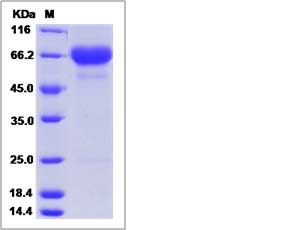Rhesus OX40 / CD134 Protein (Fc Tag)
OX40, CD134
- 100ug (NPP2909) Please inquiry
| Catalog Number | P90846-C02H |
|---|---|
| Organism Species | Rhesus |
| Host | Human Cells |
| Synonyms | OX40, CD134 |
| Molecular Weight | The recombinant rhesus TNFRSF4 consists of 426 amino acids and predicts a molecular mass of 47 kDa. |
| predicted N | Leu 29 |
| SDS-PAGE |  |
| Purity | > 90 % as determined by SDS-PAGE. |
| Protein Construction | A DNA sequence encoding the rhesus TNFRSF4 (XP_001090870.1) (Met1-Ala216) was expressed with the Fc region of human IgG1 at the C-terminus. |
| Bio-activity | |
| Research Area | Immunology |Cluster of Differentiation (CD) |B Cell CD Antigen |
| Formulation | Lyophilized from sterile PBS, pH 7.4. 1. Normally 5 % - 8 % trehalose and mannitol are added as protectants before lyophilization. Specific concentrations are included in the hardcopy of COA. |
| Background | OX40 (CD134) and its binding partner, OX40L (CD252), are members of the tumor necrosis factor receptor/tumor necrosis factor superfamily, is known to break an existing state of tolerance in malignancies, leading to a reactivation of antitumor immunity. The interaction between OX40 and OX40L plays an important role in antigen-specific T-cell expansion and survival. OX40 and OX40L also regulate cytokine production from T cells, antigen-presenting cells, natural killer cells, and natural killer T cells, and modulate cytokine receptor signaling. In line with these important modulatory functions, OX40-OX40L interactions have been found to play a central role in the development of multiple inflammatory and autoimmune diseases, making them attractive candidates for intervention in the clinic. Conversely, stimulating OX40 has shown it to be a candidate for therapeutic immunization strategies for cancer and infectious disease. |
| Reference |
